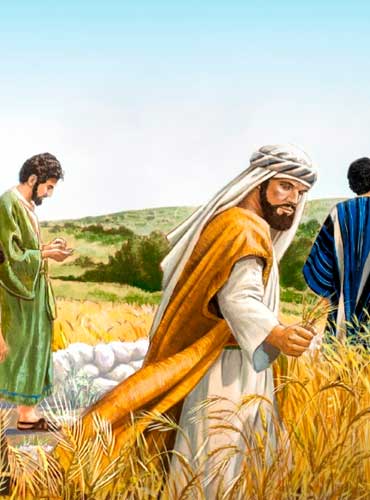Tuesday of the Second Week of Ordinary Time – Option 2 – Mk 2:23-28
Today’s Gospel passage from Mark is one of series of discussions that Jesus has with the Pharisees, and one of several that regard the Sabbath observance. It should call our attention that, on a Sabbath, in the middle of a field that is probably some distance from the city, the Pharisees happen to be on hand, eagerly keeping their eyes open to see if Jesus or the disciples will violate some rule or precept. It would seem that if the disciples are guilty of work on the Sabbath, then the Pharisees too must be guilty of violating it too, at least in their refusal to rest and give thanks to God.
Here, then, we see how Jesus “develops the true meaning of the biblical Sabbath,” as Pope Saint John Paul II wrote; Christ “restores to the Sabbath observance its liberating character, carefully safeguarding the rights of God and the rights of man.” The Sabbath is supposed to be freeing, since it raises us above the monotony of the week and gives us a moment to contemplate God’s goodness, to try to see everything as He did on that first Sabbath. It is God’s gift to man, a call for him to return each week to seek his creator. Rather than find themselves freed by it, the Pharisees were enslaved to their traditions and their rigid understanding of the observance of the Sabbath. Jesus’ citation of the story of David, an event which probably took place on a Sabbath, since the Law prescribes for the showbread to be removed and consumed on that day, highlights that there is something greater than the observance of merely human laws; that something greater is the spirit of God and His precepts.
While we usually keep a festive and joyful spirit on Sunday, we can ask ourselves a more general question about the way we view God’s goodness in our lives. All the things that God gives us, all the challenges that He allows to come our way, are His gifts to us. Do we view them as heavy burdens, and get angry or upset? Or do we use them to turn our eyes towards our Creator and Redeemer? The Pharisees were stuck with their merely human point of view; rather than be freed by God’s design, they exalted themselves and their opinions until it made them miserable. We too are faced with that same choice: do we turn to God, or do we turn to ourselves?
Today, let us pray, through the intercession of Mary, Mother of the Word Incarnate, for the grace to turn to Jesus in our difficulties, so that we can always discover the true meaning of the gifts that He sends us.





